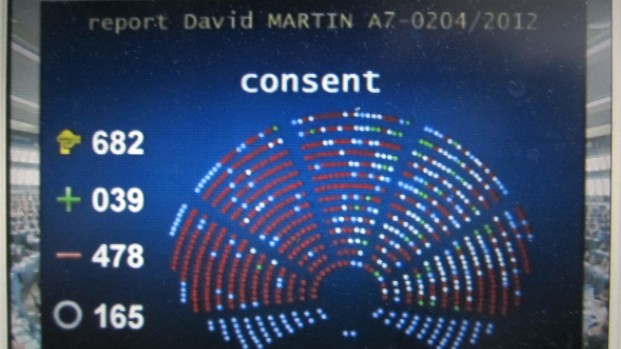It was an extraordinary day; many thousands of us watched the live streaming session as the MEPs prepared to make the final vote.
RE: Fjellner
Activists in anti-ACTA t-shirts sat among sober-suited MEPs, and when the vote to delay came up, Christofer Fjellner MEP spoke passionately in favour of deferring the vote until after the European Court of Justice. The day before, he had repeatedly asked all those who expressed anti-ACTA opinions if they'd even read the documents, and he seemed so determined to delay the vote that I was, to be honest, quite mean about him on Twitter and G+. I said he was the problem and called him obnoxious. To be honest, I wasn't much better. Anyway, when it emerged that he had abstained when the vote to accept or reject the treaty came up, I was flabbergasted. Today, I read in his blog,
I chose to abstain from the final vote on the agreement itself. I simply felt it was irresponsible to say either yes or no to ACTA at this time.In a conversation with Glyn Moody on G+, we agreed that there is serious misinformation in that blog post, but that doesn't explain his abstension. Is he in denial about Article 27?
That's the part that made my hair stand on end. See Richard O'Dwyer for what this actually looks like when put into practice. The lobbyists found other ways to get that into our legislation, so linking is illegal. ACTA would have harmonised this. That part about freedom of expression, etc., is rendered meaningless by "fair process," a meaningless term in international law. Paragraph 4 contradicts itself by demanding that ISPs provide identifying information on suspected infringers without undermining "fair process," etc. Paragraphs 5 and 6 demand the enforcement of and protection against DRM. Article 36 was the worst part by far:
Enforcement in the Digital Environment
1. Each Party shall ensure that enforcement procedures, to the extent set forth in Sections 2 (Civil Enforcement) and 4 (Criminal Enforcement), are available under its law so as to permit effective action against an act of infringement of intellectual property rights which takes place in the digital environment, including expeditious remedies to prevent infringement and remedies which constitute a deterrent to further infringements.
2. Further to paragraph 1, each Party's enforcement procedures shall apply to infringement of copyright or related rights over digital networks, which may include the unlawful use of means of widespread distribution for infringing purposes. These procedures shall be implemented in a manner that avoids the creation of barriers to legitimate activity, including electronic commerce, and, consistent with that Party's law, preserves fundamental principles such as freedom of expression, fair process, and privacy.
Since the official language is English, it would have been tough on those of us who don't speak English as a first language. Despite the overwhelming no vote, EU Commissioner Karel de Gucht plans to submit ACTA to the European Court of Justice anyway, then try to sneak it back on to the agenda at a later date.
The ACTA Committee
The Committee may amend the rules and procedures.
7. Notwithstanding the provisions of paragraph 4, during the first five years following the entry into force of this Agreement, the Committee's decisions to adopt or amend the rules and procedures shall be taken by consensus of the Parties and those Signatories not Parties to this Agreement.
8. After the period specified in paragraph 7, the Committee may adopt or amend the rules and procedures upon the consensus of the Parties to this Agreement.

Responses
Jubilant responses to the defeat of the treaty led to some sober reminders that we have other battles to fight to ensure our freedom. ACTA is dead in Europe, and as rapporteur David Martin MEP pointed out, activism has killed any chance of getting it adopted in other countries.
Some activists have expressed disgust that anyone would vote in favour of ACTA, but as I pointed out in an Internet Freedom Movement post, they had their reasons. The 39 who voted in favour have been named, and there may be some repercussions as a result. For the record, I don't think this is right and have made a post to that effect on the Internet Freedom Movement to counter a name-and-shame post by another admin. It's a Google Plus page so it's hard to tell which of us have actually made the post. I'd like to see an identifying feature made possible so I don't get the blame for things like that.
I've also posted about the public consultation on trade relations with the US from the European Commission. If we can steer it towards an overhaul of IPR law that balances the need to protect the public from counterfeits and safeguarding our civil and digital rights, we can finally stop worrying about state surveillance for the benefit of the content industry.
So yeah, we have good cause to celebrate; if we don't it'll suck the hope out of us that we can actually win. Yesterday, we declared independence from foreign lobbyists' attempts to push their agendas onto us. Today, we need to remember that the battle has been won, but the war goes on until we finally have a set of globally-respected laws that keep us free to express ourselves and share culture while protecting the innovators and creators that make it possible.


No comments:
Post a Comment